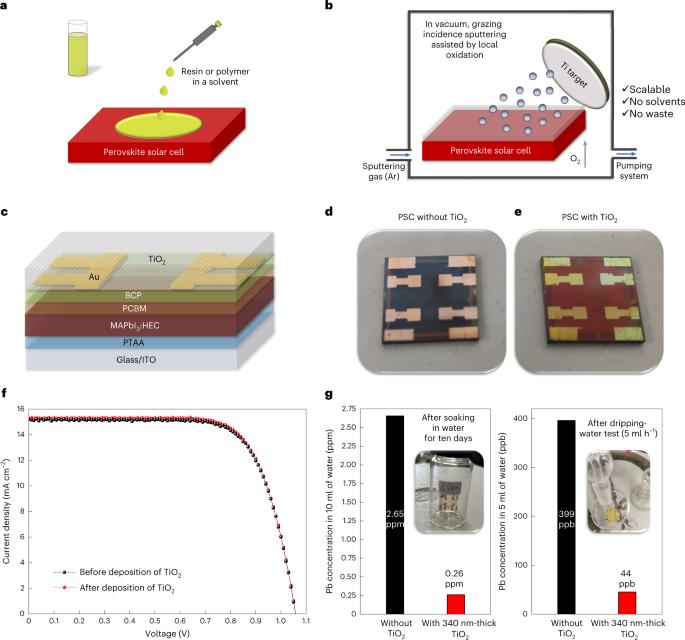Preventing lead leakage in perovskite solar cells with a sustainable titanium dioxide sponge
IF 25.7
1区 环境科学与生态学
Q1 ENVIRONMENTAL SCIENCES
引用次数: 4
Abstract
As the market uptake of perovskite solar cells (PSCs) is projected to grow rapidly, this clean energy technology will play an increasingly important role in reducing the global carbon footprint. However, one of the major barriers to its full commercialization is the presence of toxic lead (Pb), which enables the current record in photoconversion efficiency but risks being released into the environment when subjected to water or rain. Here we show that Pb leakage can be prevented by applying a transparent titanium dioxide (TiO2) sponge that allows for an efficient Pb sequestration of 58 ng cm−2 nm−1. Already an essential material for PSCs, the additional use of TiO2 through a scalable and solvent-free sputtering process promises extra cost benefits and higher sustainability. Further demonstration of the sponge application with desired thickness on ready-to-use devices, glass and polymeric foils enforces the practical value of the current approach. Our study provides a sustainable solution to one of the environmental and health risks of PSCs and would accelerate their practical applications. The presence of toxic lead enables high photoconversion efficiency of perovskite solar cells but poses environmental and human health concerns. Here the authors address the issues by introducing a cost-effective TiO2 absorption layer through a scalable process.

用可持续的二氧化钛海绵防止钙钛矿太阳能电池中的铅泄漏
随着包晶体太阳能电池(PSCs)的市场占有率预计将快速增长,这种清洁能源技术将在减少全球碳足迹方面发挥越来越重要的作用。然而,其全面商业化的主要障碍之一是有毒铅(Pb)的存在,它使目前的光电转换效率创下纪录,但在遇到水或雨水时有可能被释放到环境中。在这里,我们展示了通过使用透明的二氧化钛(TiO2)海绵可以防止铅的泄漏,这种海绵可以有效地将铅隔离在 58 纳克 cm-2 nm-1 的范围内。二氧化钛已经是 PSC 的基本材料,通过可扩展的无溶剂溅射工艺额外使用二氧化钛,有望带来额外的成本效益和更高的可持续性。在即用型设备、玻璃和聚合箔上以所需厚度进一步展示海绵应用,增强了当前方法的实用价值。我们的研究为多晶硅的环境和健康风险之一提供了可持续的解决方案,并将加速其实际应用。有毒铅的存在使包晶石太阳能电池具有很高的光电转换效率,但也带来了环境和人类健康问题。在这里,作者通过一种可扩展的工艺引入了一种具有成本效益的二氧化钛吸收层,从而解决了这些问题。
本文章由计算机程序翻译,如有差异,请以英文原文为准。
求助全文
约1分钟内获得全文
求助全文
来源期刊

Nature Sustainability
Energy-Renewable Energy, Sustainability and the Environment
CiteScore
41.90
自引率
1.10%
发文量
159
期刊介绍:
Nature Sustainability aims to facilitate cross-disciplinary dialogues and bring together research fields that contribute to understanding how we organize our lives in a finite world and the impacts of our actions.
Nature Sustainability will not only publish fundamental research but also significant investigations into policies and solutions for ensuring human well-being now and in the future.Its ultimate goal is to address the greatest challenges of our time.
 求助内容:
求助内容: 应助结果提醒方式:
应助结果提醒方式:


